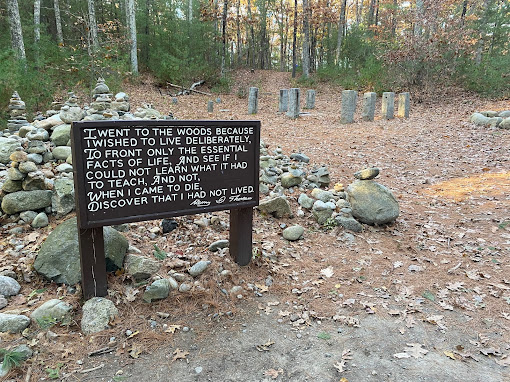Unfinished
I used to be an intellectual until I wised up.
— Unknown
The words are homespun, folksy, and utterly infuriating. Maybe the author of this bumper-sticker witticism—which appears to date back at least to the early 1970s—deserves the benefit of the doubt. Maybe it's a caution against the Dunning-Krueger Effect, the wising up process describing the acquisition of a self-awareness that brings with it a healthy understanding of one's own limitations. More likely, though, is that it's just what it sounds like, a dismissive reduction of the value of the formal and disciplined pursuit of knowledge in favor of a more intangible combination of life experience and good ol' common sense. There's book smarts and then there's street smarts.
American society has long had an uneasy relationship with its more learned side. We celebrate the polymathic intellect of Jefferson and the autodidactic intellect of Lincoln, but also the plain-spokenness of Davy Crockett. We put a man on the moon at the close of the 1960s, followed less than a decade later by wrestler Fred Blassie recording a novelty record in which he describes—to apparently hilarious effect—the process of cutting up a pencil-neck geek for fish bait. I, along with probably most of this article's readers, am old enough to remember a time when words like nerd and geek had unequivocally negative connotations; they were certainly never words that one would use to self-identify.
Beginning in the early 2000s, and continuing into the mid 2010s, we seemed to be making our peace with our intellectuals. The increasingly technical nature of society and the economy brought the value of education to the fore. Television shows like The Big Bang Theory and comic strips like XKCD began for the first time portraying the geek subculture in a non-condescendingly sympathetic way. Old-timey wanted posters proclaimed that Schrödinger's Cat was "Wanted: Dead and Alive". The expression geek chic entered the American lexicon.
Around 2015, things took a much darker turn. It became fashionable to watch a YouTube video and assert, in the words of Isaac Asimov, that "my ignorance is just as good as your knowledge" on topics ranging from the authenticity of the Apollo moon landings to the evidence for climate change to the safety and efficacy of vaccines. A presidential campaign was waged—and won—on openly mocking science, journalism, and other formalized pursuits of knowledge. Anti-intellectualism reasserted itself, bigly.
In the early 1980s, a North Carolina author and poet named Thomas Rain Crowe spent a year living alone in a small cabin in a remote part of the Appalachians, where he fished, hunted, practiced subsistence farming, and wrote. The result of the writing was an engaging and nicely paced book called Zoro's Field. If the story sounds familiar, it's because Henry David Thoreau, about a century prior, spent two years, two months, and two days doing much the same along the shore of Walden Pond, near Concord, Massachusetts. Crowe's work is peppered with references to his gentle and respectful borrowing of Thoreau's idea. Thoreau's nineteenth-century prose turns out to be far more impenetrable to a modern reader than Crowe's. The intention to start, and inability to finish reading Walden has become a bit of a running gag among this country's literati, and while describing myself as belonging to the literati is more than a bit of a stretch, that hasn't stopped me from joining in on the fun. (This pasta water is taking forever to boil. Maybe I can finally finish reading Walden.)
In the fall of 2021 I had the opportunity to visit New England. I made the half mile walk along Walden Pond's eastern shore from the visitors' center to the site of Thoreau's cabin. As any visitor should, I photographed the sign bearing the quote from Walden's opening chapter in which Thoreau lays out, as his purpose for being in the woods, to "live deliberately, . . . and not, when I came to die, discover that I had not lived." Behind the sign was something that looked out of place at first. Rocks, thousands of them, some placed neatly, some placed haphazardly, were piled behind the sign and to the side of the cabin site. Another interpretive plaque explained that on Thoreau's death, Bronson Alcott (father of Louisa May Alcott) walked from the garden of his Concord home out to the site of Thoreau's pond-side cabin and placed a rock, as a simple way of saying that his friend had been there, and that he had mattered. I left without placing a stone. It seemed cheesy to do so just because I had read an interpretive plaque and saw that other people had done it.
It was later that night, relaxing at the Concord inn we were staying at and planning the next day's POTA activation in Maine, that it hit me. After all the false starts, all the setbacks, all the disappointments of the past several years, there was something profoundly heartwarming in what I had seen that afternoon. In the face of ever-increasingly cruel and self-satisfied anti-intellectualism, visitors from all around have made it a point to walk the eastern shore of a pond where a book too difficult for anyone to finish was written, to leave a stone for Bronson Alcott's old friend, and to say, "You were here, and you mattered."
At the gift shop, I bought an annotated copy of Walden. This time, I'm going to finish it. And I'm going to read more, because I haven't been reading enough lately. And in a small way I'm going to do my damndest to make myself a part of a society that never stops learning and never stops appreciating the value of learning and never smugly belittles those who dedicate their lives to the unfinished and never-ending business of finding knowledge. And the next time I'm in New England, I'll walk out to the site of the old cabin and leave a stone.



Comments
Post a Comment